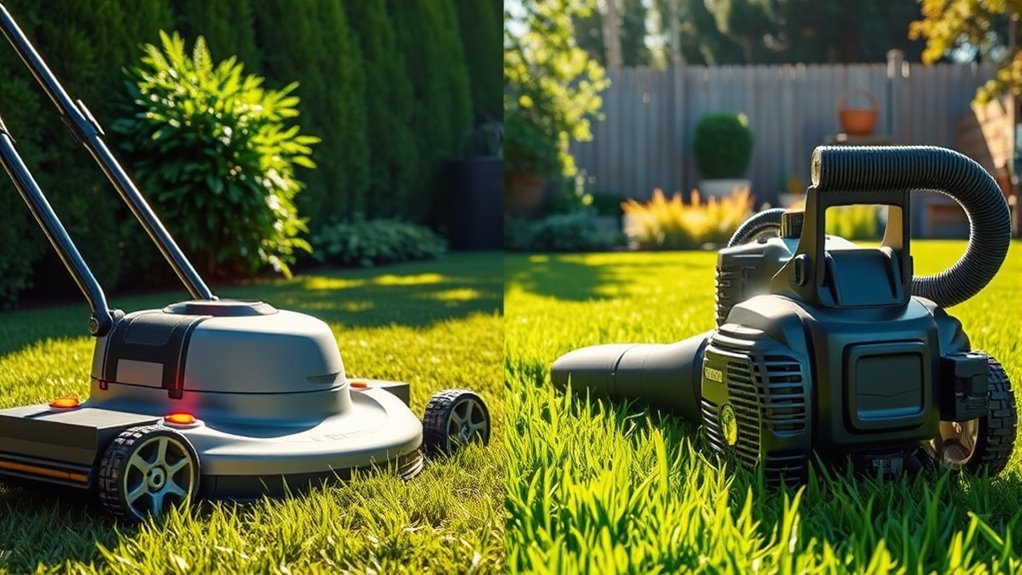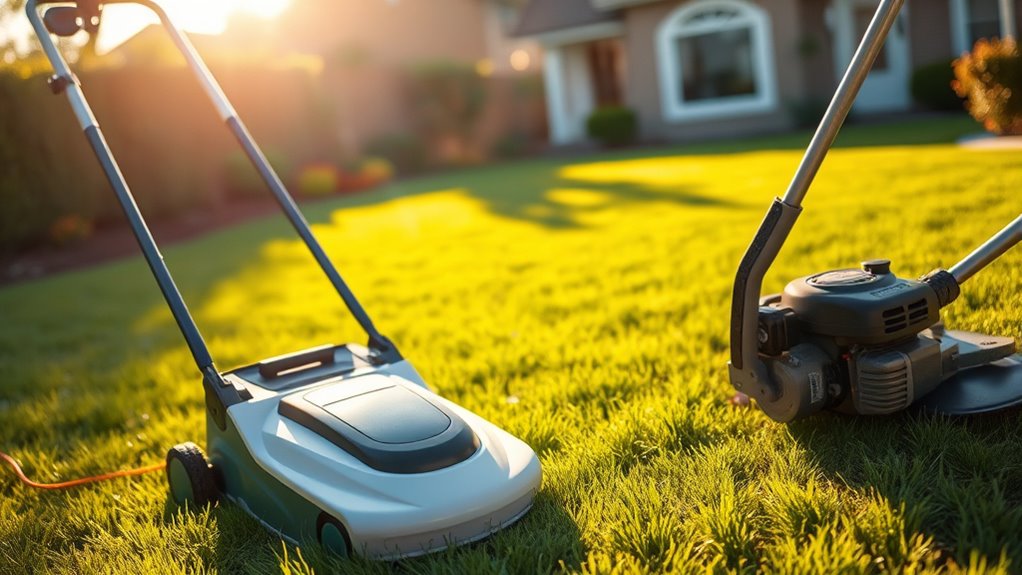If you have a small to medium-sized yard, electric lawn equipment might be your best choice since it’s quieter, easier to maneuver, and costs less to run over time. They produce no emissions and require less maintenance, making them environmentally friendly and convenient. However, for large or tough lawns, gas tools offer more power and consistent performance, especially on extensive or dense grass. To find out which option suits your yard best, explore the details below.
Key Takeaways
- Consider electric equipment for small to medium yards due to quieter operation and easier maneuverability.
- Choose gas mowers for larger or tougher lawns needing more power and consistent performance.
- Electric models have lower long-term costs with less maintenance, but initial investment and battery replacement can be higher.
- Opt for electric tools if environmental impact and noise reduction are priorities.
- Gas equipment may be necessary for extensive areas where maximum power and endurance are essential.

Are you trying to decide between electric and gas lawn equipment? It’s a common dilemma, and the choice depends on your yard’s size, your budget, and your priorities. Electric mowers tend to cost more upfront, but they save you money in the long run because they don’t require fuel or oil changes. Plus, they’re more environmentally friendly, producing zero emissions and contributing less to air pollution. You’ll also appreciate how much quieter they are, creating a peaceful mowing experience without the loud roar of gas engines.
Performance is another key factor. Gas mowers usually pack more power and deliver cleaner cuts, especially for larger lawns or thicker grass. Their higher torque makes them better suited for tackling tough terrain, and they maintain consistent performance throughout the job. On the other hand, electric mowers are typically ideal for smaller yards, handling about a quarter acre per charge. As the battery drains, power may decrease, but for small to medium-sized lawns, this isn’t usually an issue.
Gas mowers offer more power for larger or tougher lawns, while electric models suit small to medium-sized yards.
When it comes to maintenance, electric mowers are simpler. They have fewer moving parts, so you won’t need to replace many components or deal with oil and fuel spills. Their batteries might need replacing eventually, which can be costly, but overall, electric models require less upkeep. Gas mowers, while often more durable with proper maintenance, need regular oil changes, fuel refills, and parts replacements, which can add up over time.
From an environmental perspective, electric mowers are the clear winners. They produce no emissions, reducing your carbon footprint, and they generate less waste since they don’t require oil or fuel disposal. They also operate more efficiently, especially newer models designed with energy conservation in mind. Noise pollution is another advantage; electric mowers are considerably quieter, making them suitable for neighborhoods with noise restrictions.
User preferences also influence your decision. Electric mowers are lighter and easier to maneuver, which many homeowners prefer. While some worry about the initial cost of batteries, most find the lower operating expenses and environmental benefits compelling. Conversely, if you have a large yard with dense, tall grass, a gas mower’s power and longer run time might better meet your needs. Ultimately, think about your yard size, budget, and values to choose the equipment that fits best.
Frequently Asked Questions
How Long Do Electric Lawn Tools Typically Last Before Needing Replacement?
Electric lawn tools typically last about 5 to 7 years before needing replacement. You’ll notice the battery life diminishes after 2 to 3 years, requiring replacements to keep your equipment running smoothly. Proper maintenance, like cleaning and storing them correctly, can extend their lifespan. Investing in high-quality batteries and following manufacturer guidelines will help you get the most out of your electric tools, saving you money in the long run.
Are Gas Lawn Equipment Models More Durable Than Electric Ones?
Think of your lawn equipment as a trusted old friend. Gas models tend to be more durable, lasting over a decade with proper care, much like a seasoned companion. They have more moving parts, which can wear out, but they handle tough jobs well. Electric models are lighter and easier to maintain but may not match the longevity of gas equipment, especially under demanding conditions.
What Are the Safety Concerns Specific to Electric Versus Gas Tools?
You should consider the safety concerns specific to each tool. Electric tools produce less noise and vibration, reducing strain and hearing risks, but they pose electric shock hazards and require careful cord or battery management. Gas tools emit harmful fumes, involve fuel handling risks, and create more noise and vibration, increasing injury chances. Always follow safety guidelines, wear PPE, and maintain your equipment properly to minimize these risks.
Can Electric Lawn Equipment Handle Professional or Heavy-Duty Landscaping?
Powerful, persistent, and practical, electric equipment might seem promising, but it struggles with serious, sustained landscaping tasks. You’ll find that limited battery life and lower cutting capacity challenge heavy-duty jobs, especially on larger or tougher terrains. For professional projects, gas tools deliver the consistent, robust power needed to conquer dense, demanding conditions. So, if your yard’s large or labor-intensive, gas equipment generally offers the grit and grind you require.
How Do Maintenance Costs Compare Between Electric and Gas Lawn Equipment?
When comparing maintenance costs, electric lawn equipment is more affordable. You’ll spend around $20 annually on blade sharpening or replacement, with battery replacements every 5-10 years costing about $75–$100. In contrast, gas equipment needs more frequent maintenance like oil, spark plug, and filter changes, totaling about $150 yearly. Electric models also have simpler upkeep, fewer parts to repair, and lower long-term costs, making them a cost-effective choice.
Conclusion
Choosing between electric and gas lawn equipment really depends on your yard’s needs and your preferences. Both have their perks, so it’s all about finding the right fit for your lifestyle. Remember, don’t put all your eggs in one basket—consider your budget, maintenance, and eco goals. Whichever you pick, with a little effort, your yard will look excellent. In the end, it’s about working smarter, not harder, to make your outdoor space shine.










